The frozen north is thawing as record heat arrives. Is that a climate disaster, or not? Boston College researcher and Professor Jeremy Shakun reports new science on this key tipping point. Looking for some assurance in troubled times? Marjory Wildcraft returns with her new book “The Grow system – The Essential Guide to Modern Self-Sufficient Living, from Growing Food to Making Medicine”.
Listen to or download this Radio Ecoshock show in CD Quality (57 MB) or Lo-Fi (14 MB)
One of the lurking climate monsters is hidden, frozen in the North. When the permafrost thaws, will Earth heat too far for humans and other creatures? New research from Canadian caves contain clues. A previous thaw did not significantly change the atmosphere or cook the planet. But now, after 400,000 years of building plant matter, and unnaturally fast warming by humans – nobody knows for sure. Boston College researcher and Professor Jeremy Shakun reports new science on this key tipping point.
Looking for some assurance in troubled times? Marjory Wildcraft shows how to grow up to half your family food in a normal backyard – and how to treat problems with herbs you thought were weeds. In this third appearance, as the pandemic brings people to food backup and self-sufficiency, Marjory talks about her new book “The Grow system – The Essential Guide to Modern Self-Sufficient Living—from Growing Food to Making Medicine”.
What you need to know and how to do it – on this week’s Radio Ecoshock.
===========================================================
CAVE-DIVING FOR THE DEEP PAST AND NEAR FUTURE
Everybody knows when the permafrost thaws greenhouse gases will go through the roof, forcing terrible global warming. Surprising new science says maybe, maybe not. A team of American and Canadian experts just published an important new study about permafrost thaw – as the modern Arctic hits record heat. As always, the truth is weirder than we thought.
Our guide is co-author Dr. Jeremy D. Shakun, Assistant Professor of Earth and Environmental Sciences at Boston College. He is co-author of the new paper “Increasing Pleistocene permafrost persistence and carbon cycle conundrums inferred from Canadian speleothems“. That was published in Science Advances on April 28, 2021.

Dr. Jeremy Shakun, Boston College
Listen to or download this 26 minute Radio Ecoshock interview with Dr. Jeremy Shakun in CD Quality or Lo-Fi
Or watch this Radio Ecoshock interview with Dr. Jeremy Shakun on YouTube
In 2020, a team lead by Israeli scientist Anton Vak published their study of cave drippings (“speleothems”) in northern Russia. These are formed when water drips or runs through caves, leaving mineral deposits. Those deposits can form drooping columns from the roof of the cave (“Stalactites”) or accumulate as piles rising on the floor (“Stalagmites”). They can also just form rivers of rock in the case (“flowstone”). But those formation stop when all water is frozen, during the permafrost. So they can indicate when the permafrost was there, and when it was not.



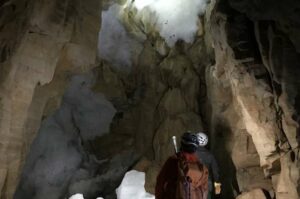
Speleothems or “cave-drippings” (3 U.S. Gov’t photos + Jeremy Shakun)
The surprising results in Russia showed the far Arctic north had thawed during the last million years for sure. Speleothems formed during that time. But after about 400,000 years ago, no Speleothems were formed. The Arctic stayed frozen during all that time right up until the present. And yet some plants grew on the surface during summers. Their carbon could not be fully decomposed because of the continuing cold, and build up as large deposits of carbon in the Arctic. Now if the permafrost thaws, a lot of that carbon could be released, further heating the world. That is a huge concern.
But were the Russian cave deposits just a local climate phenomenon? To check that out, New England scientists including Jeremy Shakun traveled to a series of caves in Canada. Some were in the Canadian Rockies further south, where only the high altitude keeps the ground frozen. Most were in the north, all the way to Yukon. They found a record similar to those in the Russian caves, confirming the great cooling of the past 400,000 years was global, and that permafrost had thawed within the last million years.
THE BIG PROBLEM WITH PERMAFROST THAW
Here is the problem: air samples from ice cores in Greenland and elsewhere show there was not a huge burst in carbon dioxide, or warming during that last million years. There were hotter times, but nothing equivalent to releasing all the carbon in the permafrost. So when the permafrost thawed last time, what happened to all that carbon. We discuss that in the interview. I wonder whether the release was so slow that other natural forces managed to capture the carbon keeping atmospheric levels relatively low.
We don’t know for sure. It matters a lot – because we are now heating the Arctic rapidly with greenhouse gas emissions. Even more carbon has accumulated during the last 400,000 year freeze-up of all organic matter. Will that accumulation, matched with the unprecedented rate of our warming create a wave of new carbon into the atmosphere? Or will something balance that off? I don’t think it’s too much to say that civilization hangs in the balance of the answer to those questions.
NOT THE RECENT SUDDEN ABRUPT WARMINGS
Last week we spoke with Dr. Sune Olander Rasmussen about dozens of abrupt warming events called Dansgaard–Oeschger events. In the last 100,000 years, Greenland and the North Atlantic heated up anywhere from 5 to 12 or more degrees Celsius within a few decades. These were very shocking events. But according to the cave drippings, they did not last long enough to thaw the permafrost.
THE SEA ICE ANGLE
The title of the paper led by Vaks is “Palaeoclimate evidence of vulnerable permafrost during times of low sea ice.” The record shows there is some kind of link between low sea ice and permafrost thaw. That is super important, because sea ice now is lower than it has been in many thousands of years. Record hot Arctic temperature and ocean heat currents are likely responsible for the low sea ice these days.
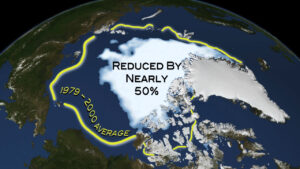
Graphic from NOAA
What is this relationship? Does low sea ice create conditions that push permafrost thaw? Perhaps the extra moisture from the sea leads to more snow cover, which would reduce winter freezing. Dr. Shakun suggests other possible causes.
Vaks et al say:
“Reduced sea ice may contribute to warming of Arctic air which can lead to warming far inland. Open Arctic waters also increase the source of moisture and increase autumn snowfall over Siberia, insulating the ground from low winter temperatures. These processes explain the relationship between an ice-free Arctic and permafrost thawing before 0.4 Ma. If these processes continue during modern climate change, future loss of summer Arctic sea ice will accelerate the thawing of Siberian permafrost.”
But again, we do not know for sure if low sea ice drives permafrost thaw or the other way around. Perhaps they are both part of a larger pattern which includes changes in ocean currents. A giant experiment is underway now in the far north, because of our changes to the atmosphere. It’s a risky game with the climate that sustains human civilization plus all plants and animals.
=============================================================
MARJORY WILDCRAFT – GROW YOUR OWN FOOD AND MEDICINES
When the pandemic struck, there was a tremor through Western society. Would the supermarkets be restocked? Seed companies and supplies of baby chicks ran out and stopped taking orders. Maybe we should produce some of our own food? Then when hospitals became overloaded fearful places, other illness went untreated. What could we do for ourselves at home?
What a perfect time for a book showing us all how to grow our own groceries and tend to small family medical problems. What a perfect time to have homesteader and natural medicine woman Marjory Wildcraft back on Radio Ecoshock.
Listen to or download this 29 minute Radio Ecoshock interview with Dr. Marjory Wildcraft in CD Quality or Lo-Fi
From East Texas, Marjory Wildcraft welcome back. The last time we talked in 2017, a couple of Hurricanes just roared through Texas and the South. Last winter most of Texas lost power for several days during a cold snap that seemed mild by Canadian standards. Now we have the pandemic. Could there be stronger signs we need to be prepared to get through strange times?
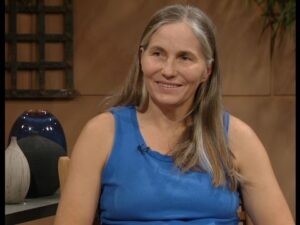
Author, homesteader, medicine woman Marjory Wildcraft
Marjory’s new book is “The Grow System – The Essential Guide to Modern Self-Sufficient Living—from Growing Food to Making Medicine”. The book builds from her phenomenally successful DVD series “Grow Your Own Groceries”.
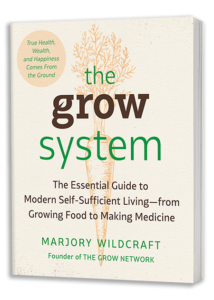
When the supermarket shelves emptied out last year, we realized if trucks don’t keep rolling there are no warehouses full of food and supplies. We are living in a world that sounds rich but is really, really fragile. But is it realistic to think each of us can be self-sufficient? Some people have a few acres and the desire to grow food. Then there is an ocean of folks living in apartments or condos downtown with hardly any access to a patch of ground. In between the majority live in suburbs where the main “crop” is lawn grass. Who can participate in the grow revolution, and who gets left out?
Back in 2011, I interviewed the original new urban homesteader Jules Dervaes. In California with a family to feed, he took a standard urban lot and turned it into year-round food and then a commercial success. As you know, I’ve been growing backyard food for decades. But Marjory wants folks to take it farther, to the neighborhood and a community food web.
Listen to/download my 2011 urban homesteader Jules Dervais interview in CD Quality or Lo-Fi (20 minutes)
Marjory Wildcraft writes in her introduction to her new book “The Grow System”:
“In this book I show you how to set up the three- part Grow System so you can successfully grow half the food you need in your own backyard by working at it less than an hour a day. I also teach you how to treat the 12 most common ailments you and your family members are likely to encounter— without relying on the pharmaceutical industry or going to a doctor”.
PREVIOUS RADIO ECOSHOCK INTERVIEWS
My 2017 interview with Marjory Wildcraft
She previously appeared on Radio Ecoshock on April 8, 2015 in a show called “Feed Yourself”.
================================================
ALEX OUT
Part of the stress of living through the Coronavirus pandemic is being exposed to just how much stupidity and insanity runs through our societies. They stop planes from India after that variant is established in the West. A young woman turns away her mother because everybody knows vaccinated people make anyone around them sterile. You see it all the time. Maybe humans are just too stupid to survive. Maybe a microbe really can beat us one day.
So it helps to see there is a little sanity still out there. Just when I thought the local climate movement was dead, five days in a row young people closed down the big bridges in Vancouver Canada, demanding real climate action.
And the Indian Point nuclear plant outside New York City shut down on April 30th. Giant, rusting, cracking old nuclear plants, loaded with decades of highly radioactive waste – yeah, we need to keep that going not 40 miles away from downtown Manhattan. What could go wrong? After half a lifetime of campaigning by New Yorkers, one of the biggest risks of their daily lives is fading away. It will take more decades to clean up, if they ever do. But at least Indian Point won’t blast out New York city with radiation worse than a nuclear bomb. Another step toward sanity. I’ll take it.
I interview top scientists around the world about big changes we make to our environment. It’s a lot of worry. In between working on the show, I zip out to my backyard and pull weeds, plant seeds, and get dirty. I think my garden has saved my sanity over the years, and double-time during this horrible COVID-19 pandemic. Polls show about 75% of Canadians admit feel mentally upset and depressed about this pandemic. The government offers a free hot-line if you need to talk. But that’s just part of the stress Americans are feeling about racism, gun violence, and weird politics. I think Marjory’s book can help a lot of people re-grow their lives and confidence.
PLEASE! DON’T FLY!
Are you tired of being stuck ? Dreaming of a big trip far away, maybe to another country. I’m pleading with you not to do it. We are already over the edge, way past the carbon we can emit and stay safe and comfortable. The pandemic “stay at home” needs to become the climate-action stay at home, or life as we ever knew it is cooked. Some of that is coming up on Radio Ecoshock.
Be sure to support Radio Ecoshock if you can. Basically, a few good listeners pay the bills so I can continue to offer this program free to people all over the world, without those annoying advertisements selling stuff you don’t need. If you can become a monthly subscriber, for any amount over $5, please do it here.
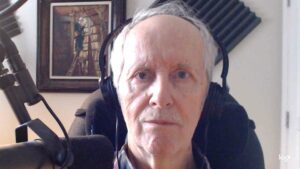
Thank you for listening, and thank you for wanting to know more about our amazing planet.